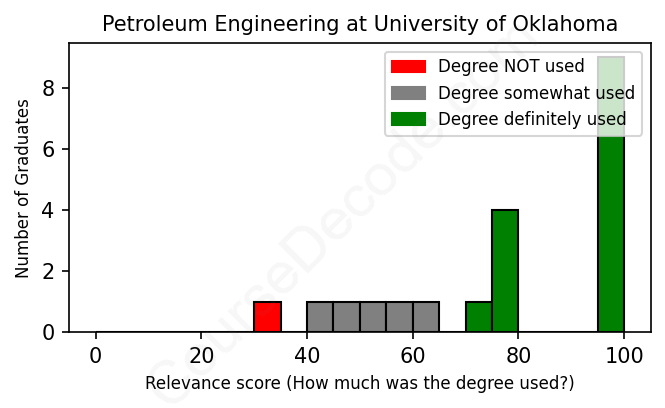
First, some facts. Of the Petroleum Engineering graduates from University of Oklahoma we've analyzed , here's how many have used (or NOT used) their degree in their career:

These are estimates based on AI analysis of 20 LinkedIn profiles (see below).
The verdict? Significantly above average. Overall, with an average relevance score of 78%, Petroleum Engineering graduates from University of Oklahoma have a much higher likelihood (+11%) of finding work in this field compared to the average graduate across all fields:
And for comparison, here's the chart for all profiles we've looked at across all degrees.
Also, after graduating, only 30% of these graduates have pursued further education other than another Bachelor's degree (such as a Masters degree or other), compared to the average across all profiles of 35%. This suggests a Bachelors degree is enough for most Petroleum Engineering graduates, and it's normal to look for work straight after graduation.
See the details:
|
Relevance score: 51% We think this person has gone into a career only somewhat relevant to their degree. We think this person has gone into a career only somewhat relevant to their degree.
DEGREE INFOGraduated in 2016 from University of Oklahoma with a Bachelor's degree in Petroleum Engineering. Also pursued further education since (see below). JOB HISTORY SINCE GRADUATIONPetrophysicist Intern BP Jun 2018 - Aug 2018 Graduate Research Assistant  University of Oklahoma Jan 2017 - Present FURTHER DEGREES DONE SINCE GRADUATINGMaster's degreeUniversity of Oklahoma 2017 - 2020 Doctor of Philosophy - PhD University of Oklahoma 2021 - 2024 ABOUTPetrophysics | Core analysis | Gas injection EOR | CCUS and UHS |
The top 10 most common jobs done by the graduates we've analyzed (ranked most common to least) are:
When looking at the job paths of graduates from the Petroleum Engineering program at the University of Oklahoma, it's clear that many have landed in roles that are closely tied to their degree. The most common positions include drilling engineers, reservoir engineers, and completions engineers, all of which leverage specific skills and knowledge gained during their studies. These jobs often involve hands-on engineering work in oil and gas production, making them directly relevant to the field of petroleum engineering. For instance, many graduates have worked for companies like Chesapeake Energy and Schlumberger, which are well-known in the industry, ensuring that their roles typically capitalize on their engineering expertise.
However, not every job on the list is related to petroleum engineering. Some graduates found themselves in roles like project managers and operations managers in fields that don’t require a deep understanding of petroleum engineering principles. For example, positions at Southwest Airlines and in general construction or management roles seemed less connected to their specialized training. While some skills from petroleum engineering can be transferable, it’s clear that a good portion of graduates have taken paths that deviate from direct engineering applications. Overall, the majority of roles reflect a strong relevance to petroleum engineering, but there’s definitely a mix of experiences that show some graduates exploring wider opportunities beyond their core expertise.
Here is a visual representation of the most common words in job titles for Petroleum Engineering graduates (this is across all Petroleum Engineering graduates we've analyzed, not just those who went to University of Oklahoma):

When looking at the career paths of Petroleum Engineering graduates from the University of Oklahoma, it's clear that many have landed solid jobs right out of college, primarily in the oil and gas industry. For instance, several graduates took on roles as drilling engineers or reservoir engineers at notable companies like Chesapeake Energy and Schlumberger shortly after graduating. Many of them have stayed within related fields, often climbing the corporate ladder to positions with more responsibility and higher pay, which is quite common in engineering careers. For the first job, it's pretty typical to see entry-level positions such as field engineer or drilling engineer.
As time passes—usually around five to ten years after graduation—the trend continues with many of these professionals moving into more senior roles. Some have transitioned into management or executive positions, like becoming a Chief Executive Officer or project manager, while others have opted to consult or start their own companies in the energy sector. However, there are a few cases where graduates have pivoted away from direct petroleum engineering roles, like into aviation or other business sectors. Overall, the majority seem to have maintained a strong connection to the energy industry, suggesting that a degree in Petroleum Engineering from OU opens quite a few doors for a successful career path. So if you’re considering this degree, it looks like you’d be in good company with a promising future ahead!
Getting a Bachelor’s degree in Petroleum Engineering, whether at the University of Oklahoma or somewhere else, can be pretty challenging. The coursework involves a lot of math, physics, and chemistry, along with specialized classes in things like fluid mechanics and thermodynamics. You’ll need to be ready to tackle some tough problem sets and lab work, so it's definitely not a walk in the park. That said, if you're passionate about the subject and willing to put in the effort, you can definitely manage it. While some students find it tougher than other engineering disciplines, others might find it easier. It really comes down to your interests and strengths!
Most commonly, in the LinkedIn profiles we've looked at, it takes people 4 years to finish a Bachelor degree in Petroleum Engineering.
Looking at the job trajectories of these Petroleum Engineering graduates from the University of Oklahoma, it seems like most of them have landed solid gigs, which likely means they're doing pretty well financially. A lot started out with companies known for paying good salaries, like Chesapeake Energy and Schlumberger, and many have worked their way up to senior or executive roles, which typically come with nice pay boosts. For instance, some people transitioned into manager or partner positions, and that's a good sign they've probably been increasing their earnings over time. While individual salaries can vary, especially with the ups and downs in the oil and gas industry, overall, it looks like they've been able to find decent money in their careers. So, if you're considering this field, it seems like there's a promising financial path ahead!
Here is a visual representation of the most common words seen in the "about" section of LinkedIn profiles who have a Bachelor degree in Petroleum Engineering (this is across all Petroleum Engineering graduates we've analyzed, not just those who went to University of Oklahoma). This may or may not be useful:

Here are all colleges offering a Bachelor degree in Petroleum Engineering (ordered by the average relevance score of their Petroleum Engineering graduates, best to worst) where we have analyzed at least 10 of their graduates:
| College | Score | Count |
|---|---|---|
 Texas A&M University Texas A&M University
|
80 | 25 |
 Louisiana State University Louisiana State University
|
79 | 26 |
 University of Oklahoma University of Oklahoma
|
78 | 20 |
 Texas Tech University Texas Tech University
|
77 | 20 |
 Penn State University Penn State University
|
75 | 11 |
 The University of Texas at Austin The University of Texas at Austin
|
75 | 18 |
 Marietta College Marietta College
|
70 | 20 |
 Colorado School of Mines Colorado School of Mines
|
69 | 30 |
 West Virginia University West Virginia University
|
68 | 10 |
 University of Houston University of Houston
|
67 | 19 |
 University of Louisiana at Lafayette University of Louisiana at Lafayette
|
63 | 10 |